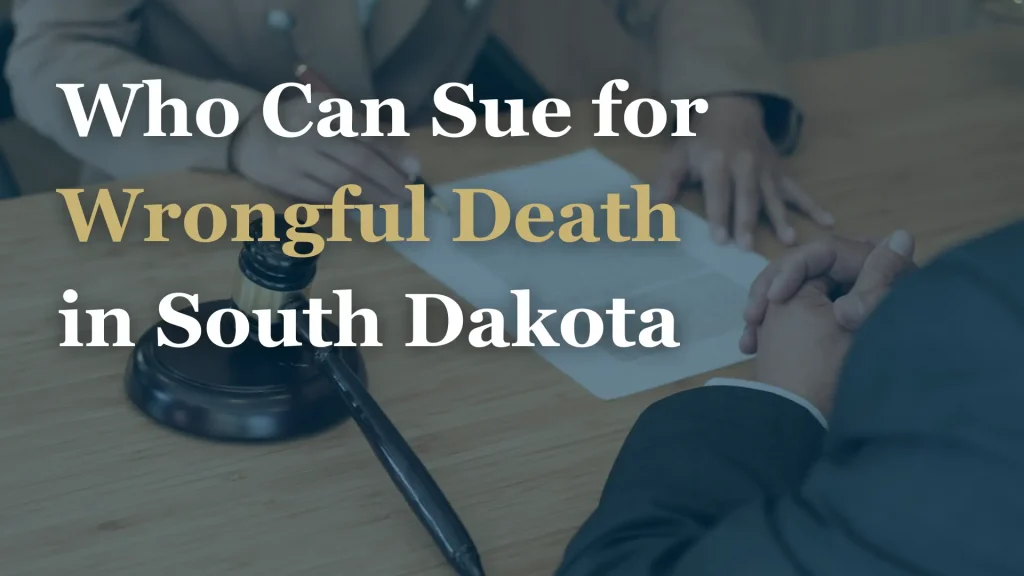
If you lost a loved one due to someone else’s negligent actions in South Dakota, you may have questions about your legal options. Specifically, you may be wondering who can sue for wrongful death. The family of the deceased can seek compensation through a wrongful death claim. This compensation can help cover expenses such as medical bills, funeral costs, and lost income.
South Dakota Wrongful Death Statute of Limitations
According to South Dakota law, the statute of limitations for a wrongful death claim is three years after the death. Failing to file your claim within this limit could bar you from receiving compensation.
An experienced South Dakota wrongful death attorney can assist with filing your claim correctly and within this time limit. They’ll also be able to help the estate’s personal representative file other paperwork and meet other deadlines associated with your claim.
Who Can File a Wrongful Death Claim in South Dakota?
In South Dakota, the only person who can file a wrongful death lawsuit is the personal representative of the estate.
There are two ways to appoint a personal representative. The first is for the deceased’s will to state who the personal representative is. But if the will doesn’t name a personal representative, the court can appoint one.
While only the personal representative can file a wrongful death claim, they do so for the deceased’s family. The first in line to recover compensation through a claim are the spouses and children of the deceased. If there’s no surviving spouse or children, the personal representative can file a claim for the deceased’s parents and next of kin. This may include siblings as well.
After a settlement or trial award, the beneficiaries may choose to divide the money among themselves. Alternatively, the court may distribute the funds in a fair and equitable manner based on the beneficiaries’ ages and conditions.
How to File a Wrongful Death Lawsuit
There are four main steps to a wrongful death lawsuit. The first is for the personal representative to initiate the claim, often with the assistance of a South Dakota wrongful death attorney.
During this phase, your South Dakota attorney will investigate the circumstances surrounding the death. They will also gather evidence to support the claim that a wrongful death occurred. This phase ends with your South Dakota lawyer notifying the at-fault party of the litigation.
Once the investigation is complete, the lawsuit moves into the negotiation phase. During this phase, your South Dakota attorney will attempt to settle the case with the at-fault party. Both parties must agree to the amount of money paid and sometimes other settling conditions. The personal representative of the deceased’s estate can determine if the suggested compensation amount is enough. Most lawsuits end at this phase.
The pre-trial discovery phase begins if the parties can’t reach a settlement. This phase is when both sides provide their evidence to each other and start building their cases in earnest. It may involve asking written questions (interrogatories), verbal questions (depositions), and requesting documents.
The fourth and final phase is the trial itself. This is the phase when your South Dakota wrongful death lawyer will present their entire case before a jury and seek the maximum amount of compensation available. Even at this phase, the defending party may reach out with a settlement offer, which the personal representative can accept or decline.
What Compensation is Available in a Wrongful Death Case?

Wrongful death compensation covers a variety of economic losses for families. Economic losses are the tangible and monetary losses you and your family suffer due to the death of your loved one. The compensation available includes:
- Lost Wages – These are the wages your loved one would have contributed to your family had they survived. Lost wage calculations are based on their pre-injury income and how long they would have worked without the fatal accident. In addition to income, lost wages include lost benefits, such as healthcare, to which you and your family may no longer have access.
- Household Services – You may be able to receive compensation for the monetary value of household services provided by your loved one before their death. For example, if they did all the yardwork, you may now have to pay someone else to perform those tasks.
- Medical Expenses – The cost of medical treatments, surgeries, hospital stays, prescription medications, and medical devices incurred before your loved one’s death can add up. Medical expense compensation seeks to cover those costs so you and your family aren’t left with the medical bills that resulted from their fatal injury.
- Funeral Expenses – This compensation is for funeral and burial costs.
In addition to the economic losses you can receive compensation for, there are also non-economic losses. Non-economic losses are the intangible losses you and your family suffered, including:
- Loss of Companionship – Depending on your relationship with the deceased, you may be able to seek compensation for loss of companionship. Companionship includes the emotional bonds, shared memories, daily conversations, and friendship you had with the deceased.
- Loss of Comfort and Affection – Sometimes called loss of consortium, loss of comfort and affection includes the loss of a romantic and marital relationship.
- Loss of Guidance and Support – Minor children are most often the ones who can seek compensation for loss of guidance and support. Losing a parent or guardian can deprive the child of a role model and someone they can rely on to teach them as they grow.
Watertown, South Dakota Wrongful Death Attorney
Have you lost a loved one due to the negligent or intentional actions of another person in South Dakota? Contact Turbak Law Office, P.C. online or at 605-886-8361 for a free consultation with one of our compassionate Watertown wrongful death attorneys. We’ll evaluate your case, explain your legal rights, and walk you through starting your claim.
Losing a loved one is never easy. The compensation you receive through a wrongful death lawsuit, however, can help keep your family out of financial trouble and allow you to grieve without the added anxiety of medical bills and lost wages. Discover the 4 phases of filing a wrongful death lawsuit after losing a loved one. Explore results from our cases, read testimonials from our clients, and learn about our experienced Watertown attorneys who are dedicated to helping you achieve the best outcome.
Related Posts:
Wrongful Death vs Survival Action Claims: What’s the Difference?
Don’t Let Your Loved One’s Life Become Undervalued After a Wrongful Death
Wrongful Death Involving a Semi Accident? Here’s What You Need to Know